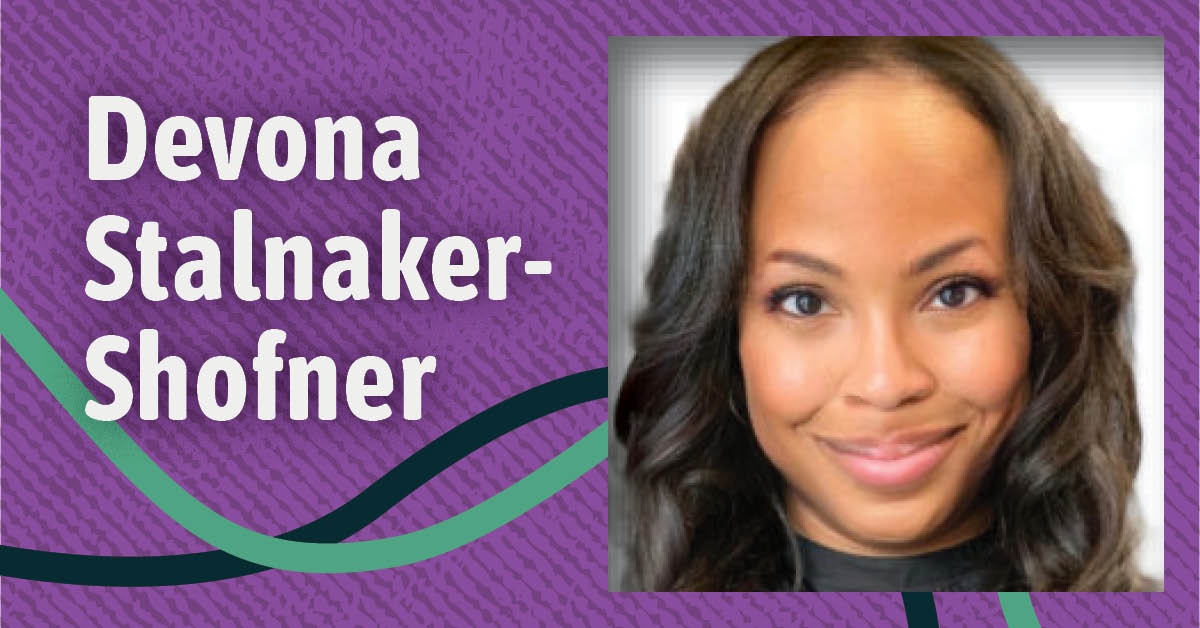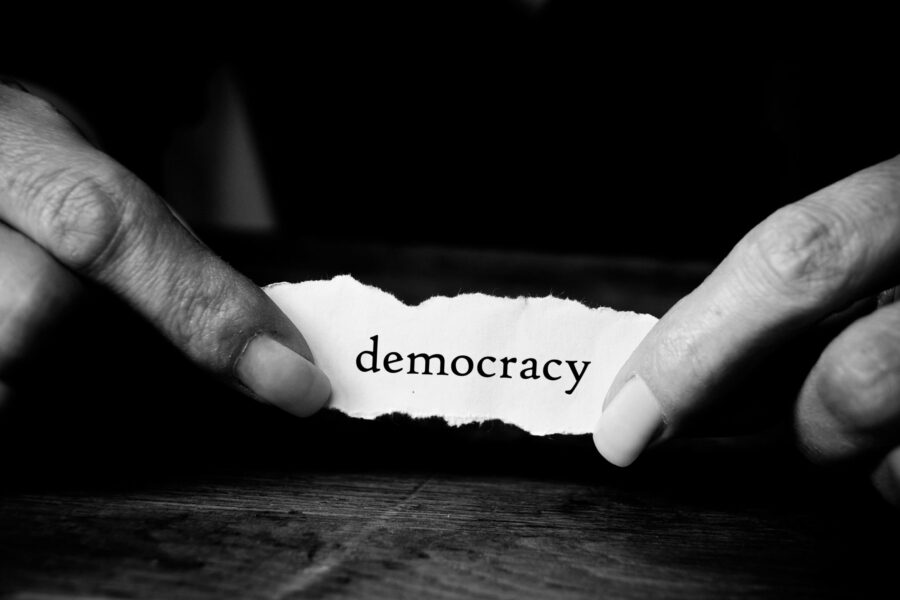When Dr. Devona Stalnaker-Shofner, EdD accepted the 2021 NARACES Social Justice Award at the Association for Counselor Education and Supervision (ACES) conference on October 8th, she envisioned her accomplishment and her work as part of a lineage of many lifetimes of social justice work, activists and educators who came before her, and her ancestors. Stalnaker-Shofner sees historical and racial trauma as a priority issue in mental health today and has a body of work on BIPOC wellness, which she presents at conferences and applies to her roles as educator and practitioner. One aspect of this is her ongoing facilitation of affinity spaces for BIPOC professionals through NARACES and ACES as a place for colleagues to engage in authentic dialogue and share experiences.
The Social Justice Award recognizes a counselor-educator or student who has made significant contributions to research and literature on social justice and/or multicultural issues. NARACES (North Atlantic Region Association for Counselor Education and Supervision) is a regional organization under the umbrella of ACES, which is a division of the international American Counseling Association. It provides professional development opportunities, holds conferences, puts out publications, and awards grants and recognitions for distinguished mental health professionals. Stalnaker-Shofner, associate professor and associate chair for Antioch New England’s Clinical Mental Health Counseling (CMCH) program, feels deeply honored by this well-deserved recognition, and recently took the time to share some details on her educational and advocacy work, her collaborative, inspirational, and innovative community of mental health colleagues, and her personal motivations for focusing on social justice in her field.
MG: Dr. Stalnaker-Shofner, congratulations on receiving the NARACES Social Justice Award! I wonder if you might be willing to share a bit about the work that preceded this award. For example, how do you utilize the scientist-practitioner-advocate training model in your practice? What does your version of social justice service work look like? Some ways you facilitate community engagement in your work?
DS-S: The past year was fraught with so much social unrest with the deaths of Ahmaud Arbery, Breonna Taylor, and most notoriously, the murder of George Floyd. Racial and social justice have been at the forefront of mental health due to societal movements related to these recent acts of racial violence, which have exposed the historical and current racial trauma experienced by Black, Indigenous, and People of Color (BIPOC). With the assistance of a group of students, we created a series of town hall meetings in response to the racial and social unrest and protests related to the deaths of unarmed Black and brown people. The initial one was held in May 2020, and was an open process group for CMHC students to share their feelings, frustrations, and concerns about the social unrest, and more importantly, to help students to begin to conceive of activism work in which they could engage. We began meeting monthly initially with CMHC students, and then in 2021, the groups were open to all AUNE students. We created different spaces with different goals—a BIPOC affinity group to allow students to share their personal and collective experiences; a white-identifying allyship group, to encourage awareness, learning, and activism and advocacy work for students to demonstrate their support of antiracist practices, and a collective group for all students to promote a kind of kinship regarding antiracist work.
At the same time, my work with NARACES as co-chair of the Wellness Committee was evolving into advocacy work with respect to BIPOC counselor educator faculty. I reflected on all that I was feeling as a Black woman working at a predominately white institution, and it occurred to me that others may have been having similar feelings and experiences. In conjunction with the NARACES Advocacy Committee, we began to hold BIPOC Wellness Affinity groups as an adjunct to the NARACES Year of Learning Virtual Sessions. I began to facilitate these affinity spaces for BIPOC counselor educators and supervisors to engage in reflective conversation. This space was distinct in that it was specifically for colleagues who identify as BIPOC to share their genuine and authentic selves in a rich dialogue about their personal and collective lived experiences as faculty. This also culminated in holding similar affinity spaces at the Association for Counselor Education and Supervision (ACES) biennial national conference held in Atlanta this October.
I’ve also presented at a number of national conferences (and been a part of a number of discussion panels on the subject of racial trauma and BIPOC wellness, as well as on the subject of decolonizing counseling curricula and incorporating antiracist pedagogy and learning practices. Lastly, I serve as a mentor for graduate students engaged in activism and advocacy work with underserved and historically minoritized populations through Counselors for Social Justice, the National Board for Certified Counselors, and more recently the Association for Multicultural Counseling.
MG: It’s great to hear about practical, immediate ways people are addressing these very important—and challenging—issues in communities and institutions. Can you share more about why this work is important to you?
DS-S: Like many people, when faced with the continual senseless deaths of unarmed black and brown persons, I found myself asking not only “why is this happening?” but the more important question of, “what can I do?” I was angry, and yet I felt powerless and immobilized. How could I make a meaningful impact and effectuate social change? I began to think about my work as a counselor educator, and how I always referred to my role as “a planter of seeds of knowledge.” And then it hit me—that’s what I can do! I can begin to make a difference in the lives of my students and prepare them not only for their work as counselors, but more importantly as advocates for their clients. Clients from traditionally minoritized populations and disenfranchised communities are in need of allies, activists, and advocates to help to create inclusionary space for their voices to be heard and concerns to be addressed. White-identifying allies have a responsibility to facilitate this, and as a Black woman who is a counselor educator, I have the responsibility to teach my students how to best serve.
MG: I love the imagery you give for how you view your role as a counselor and educator as a “planter of seeds and knowledge.” Translating emotional reactions to events into constructive action is something I think we as a society are seeking models and inspiration for, and you summarize your process beautifully. What does the NARACES award mean to you professionally and personally? Who are your allies in this effort?
DS-S: As educators and activists, we hope that we are making a difference in some way. This award is so meaningful to me because it means that my work matters, is visible, and is making an impact. I’m so humbled that a colleague thought enough of me and the work in which I’ve been engaged to nominate me, and I was absolutely floored to learn that I would be the recipient of this honor. I literally dropped my phone when I read the email advising me that I had been selected for this award!
My most admired and esteemed colleagues, counselor educators who are doing amazing work with a national and international reach with respect to social and racial justice include Dr. Anneliese Singh, of Tulane University, Dr. Natoya Haskins, President Elect of ACES, and Dr. LaTonya Summers, of Jacksonville University, and founder of the Black Mental Health Symposium. Within our institution, I am inspired by Dr. Monique Bowen and her work with the Antiracism Task Force, Drs. Mariaimeé Gonzalez and Syntia Santos Dietz and their work with the Latinx Mental Health and Social Justice Institute, and Dr. Ernie Zullo and his work with LGBTQIA+ students and allies, as well as the work that’s occurring within our department by the Social Justice Pedagogy Committee led by Dr. Cathy Lounsbury in her role as Department Chair and working in conjunction with our entire faculty. This award means I am standing on the shoulders of those who have forged a path before me and I just hope I can make half of the difference and impact that they have. More importantly, as a descendant of the enslaved and as the first in my family to obtain a doctorate, I hope I make my ancestors proud and honor them as their legacy lives in me.




